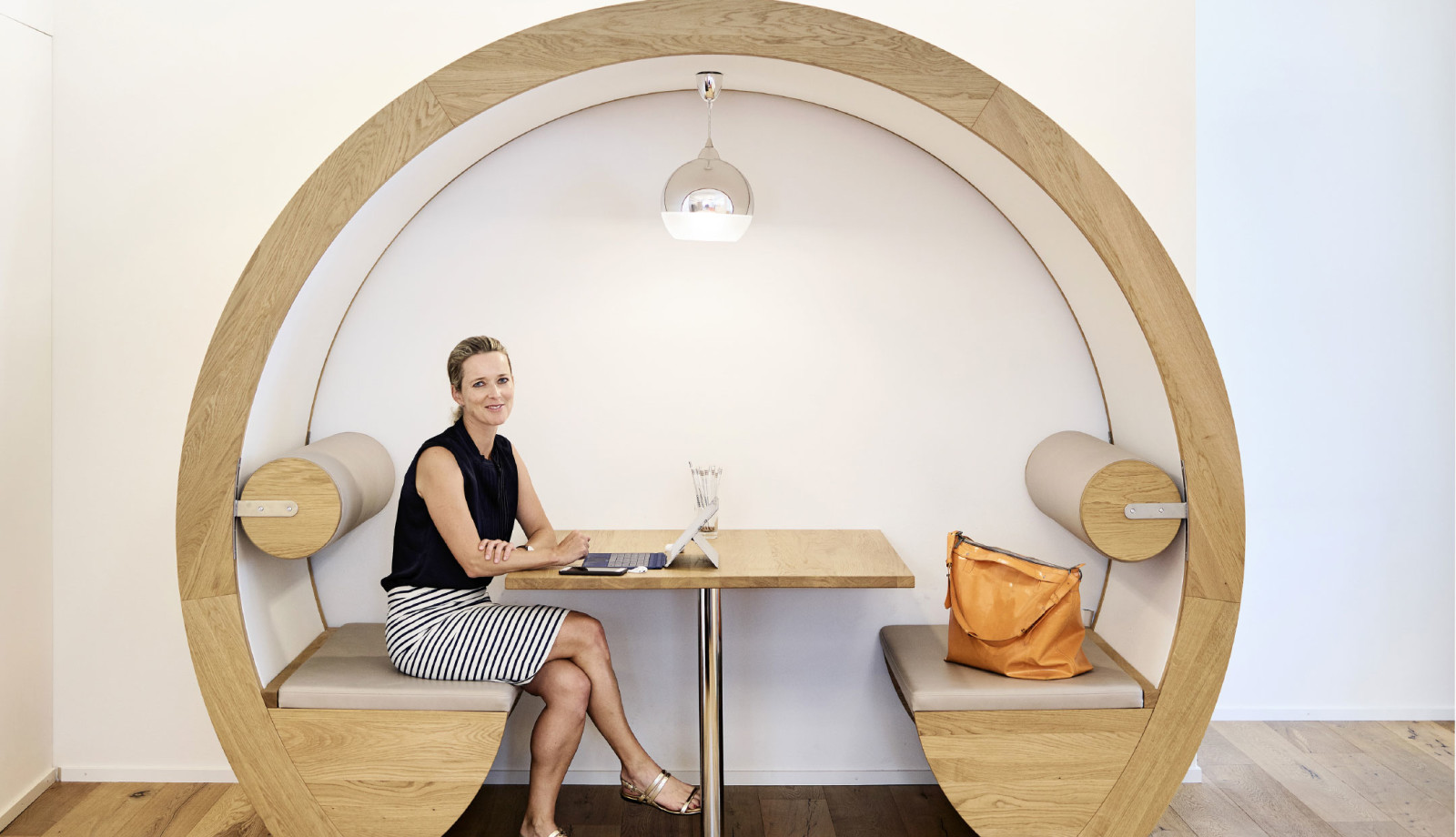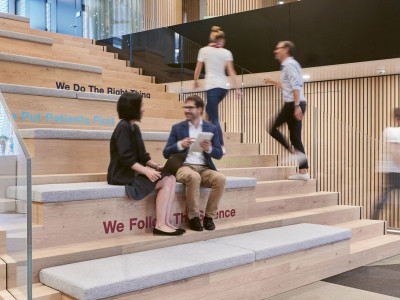
The boss’s most important skill is the ability to let go
Barbara Josef is an expert for the new world of work in the era of digitisation. She believes that although our jobs are more demanding, they are also becoming more motivating for employees. She advises bosses to trust more rather than control.
Your consultancy firm is called 5to9. So do you mainly work during the night?
The ideal definition would be that I only work for four hours (laughs). But, in reality, my working hours after the company was founded were more like five to five – so twelve hours a day . . . joking aside: the idea behind the company name is that many people doing jobs in which they are creative need to exchange ideas with others. But good ideas don’t necessarily come during office hours, and more room for manoeuvre is needed.
What is your own experience of the new world of work?
With the subject of new worlds of work, many people think of new offices and new work scenarios, such as having a home office or a co-working arrangement. But that’s only one part of the changes. The biggest change is the move to a gig economy or a freelance economy. People no longer have fixed employment but work for many different clients and support themselves through these individual projects. I never intended to start my own business and, despite having done so, I am still a part of this freelance economy – because I’ve noticed that this is the best way for me to pursue my passion for these new worlds of work and learn far more than I did working for just one company.
You advise and publish books on the subject of new work. What does that term mean?
I’m concerned with the question of how organisations are able to integrate new work scenarios into their existing work culture. My perspective is always that of established companies. Today, the issue is primarily about how new technologies and increasing automation will change work and our jobs. In concrete terms: what new skills will we need in the future? How will the new room designs look so that they foster creative thinking and maximum concentration? How can the work culture be adapted so that employees can enjoy more autonomy and creative freedom without causing the productivity of the team or the identification with the organisation to suffer?
“Openness, curiosity and a willingness to help are becoming more important.”
Which skills will become more important to employers in the future?
Our jobs are becoming more demanding and more complex, and we need to be aware of that as a society. Repetitive tasks with a simple structure are becoming increasingly automated and are delegated to machines. The OECD has defined the following four Cs as the skills of the future: creativity, communication, collaboration and critical thinking. At the moment, the biggest focus is definitely on creativity. This not only refers to artistic creativity but rather to the ability to find solutions to new problems. At the same time, new aspects are becoming more significant. One CEO said at a recent podium discussion: “In the past, we recruited people based on their skills and experience, now it’s due to their mindset and their attitude.” Openness, curiosity and a willingness to help are becoming more important. I think that’s fundamentally a good thing. At the same time, we have to be careful not to go over the top by trying to look inside people’s heads and constantly questioning their motives. Instead, we should be giving much more thought to what we can contribute personally to make work better. Sometimes, it’s banal things like having a bowl of fruit or good coffee in the staff room at break. Or it could be a case of just asking the team when the first meeting in the morning should start – so that it’s convenient for everyone.
Do we have to support the staff to adopt this open attitude?
I don’t think so – most people want to play their part and take on responsibility. They also do it in their private lives, of course. What is important is creating a work culture that supports staff to work on their own initiative. You do this by treating your staff with decency: saying thank you, approaching people and rewarding good ideas.
Managers should also be required to do this. What, for you, is the most important skill that bosses need to have in the future?
The ability to let go! Managers have learnt to control and supervise everything. Trust is more important nowadays. In the future, leadership has to be designed to an even greater extent through of a clear definition of goals and shared values and less through “micro-management”.
And how can managers best accompany employees in the process of transformation?
Managers undergo a double transformation. On the one hand, they have to question and redefine their own roles and, on the other, they have to follow the process of change and look to make sure that people are happy. They have to think through the new autonomy and be able to employ situational leadership. In order to design something new, they should be conversant with new technological possibilities, be a few nose-lengths ahead and know, for example, how the team is able to use “paperless notebooks” such as OneNote or Evernote. Using these new instruments oneself is one thing – then you’re simply replacing the old instrument with a new one. Things only get interesting when they are used as a team and the agenda is suddenly open in the shared notebook and everyone is able to add their points. You see what the others are contributing, and you have to take on some responsibility yourself. Technology is then no longer a substitute for something that already exists but fundamentally changes collaboration and enables something completely new, such as co-determination. Many companies have reached the first level of substitution – a home office instead of being present on site, a Skype meeting rather than a physical one. However, it is much more exciting to fundamentally change collaboration because only then do these new technologies deliver the biggest benefits.
Thanks to flexible working, employees are on site less. So how do organise communication?
Physical meetings are still required. We should have fewer meetings but make them more intensive – where people really do collaborate. Today, people often simply put the time in when they are sitting in meetings. The basic message I hear from most firms is that mobile working is a great benefit; people would rather stock up their questions than go straight to colleagues in the team with every issue. Many people are overburdened because messages are arriving via one channel or another the whole time. And in open-plan offices, people are running to another desk and asking questions. In general, mature companies work with a hybrid, whereby they don’t have a fixed home-office day but structure the day in a more conscious way. Employees arrive at the office after the worst of the morning traffic, they’ve already answered their emails at home and were able to have breakfast with their families. In the afternoon, they are on site for meetings but leave before the evening traffic jams. They then carry on working in their home office.
“The blurring of boundaries is a problem if the corporate culture is unhealthy.”
Does that apply to all levels of the hierarchy?
Yes, companies have agreed to it. Flexible working has to be available to everyone. But it is clear that bosses with a lot of meetings with clients work more externally, whereas an administrator interfaces with more people on site.
The transformation process presents new challenges for companies. What is your advice to them?
The benefits should be made the top priority: what can we do better or more efficiently as a result of the new possibilities? The introduction of the home office and co-working is not a benefit per se. It’s only when they produce an improvement in performance and this is also noticed by the client that things get exciting. In order to achieve this desired effect, a certain degree of solidarity is important. When firms introduce new ways of working with the aim of becoming more agile but plaster the whole office with rules and suffocating any spark of entrepreneurial spirit, this is counter-productive. It is equally absurd when employees block a fixed home-office day for years and show zero flexibility to enable an urgent physical appointment to be planned. Unfortunately, this is exactly the kind of stalemate we see in many companies. So, the big challenge is first to “disarm” – on both sides. My clear recommendation to companies is that they make the first move, with a degree of trust. The vast majority of employees will pay this back with a greater level of commitment.
What is the benefit of the digitised world to companies, then?
Employees act like co-entrepreneurs. Many firms no longer have a nine-to-five business and they work in different time zones. Thanks to new technologies and ways of working, staff are better able to support the course of business and they become more motivated. As a result, the relationship with clients is better. The client notices that the employees are not simply working to rule.
You see many opportunities in digitisation, but are there also dangers?
The danger is the blurring of boundaries, where staff struggle to separate work from private life in the ways they would like. I often hear staff saying that, after a day at the office, they think they have to respond when a message arrives on their mobile device in the evening. This means more work rather than people combining their work and private life better. The blurring of boundaries is more of a problem if the corporate culture is unhealthy – if employees are not confident enough to tell the boss that they want to call it a day and will do that job tomorrow.
“Thanks to new technologies and ways of working, staff are becoming more motivated.”
Digitisation and the world of work from a psychologist’s perspective
People need more social skills
“Digitisation will turn everything on its head – even the world of work,” says Andi Zemp. The psychologist, coach and psychotherapist with his own practice in Bern advises companies and public administration bodies as an organisational developer.
He sees digitisation as a “big societal experiment” that is both a blessing and a curse. Even when digital communication has countless advantages, there is the question of whether the process is a benefit to society as a whole. Zemp sees opportunities mainly for well-qualified people, while everyone else could be left behind. “More and more people are being excluded, I’m certain of it,” says the psychologist, who is confronted by the dark sides of the new world of work in his practice. “The digital gap is widening.” Many people won’t be able to keep up with the pace of change. Stress in the new world of work has increased.
“It’s better to learn to switch off your smartphone than take a mindfulness course without changing your behaviour.”
“As soon as something is running, people are alert”
Zemp is also critical of how staff can be contacted constantly via mobile devices. In his practice, he often hears the statement: It would be easier for me if I didn’t receive emails in the evening. He understands that people can hardly resist reading new work emails even in the evening. “As soon as something is running on the device, people are alert,” and that is difficult to change. Hence, the most important skill in this era of digitisation is the ability to switch off – in the literal sense of the word. “It’s better to learn to switch off your smartphone than take a mindfulness course without changing your behaviour.”
Barbara Josef takes a similar point of view. “Awareness is becoming more important,” she says. “Everyone has to find out for themselves what’s best for them and then negotiate with their manager and the team.” However, in contrast to Zemp, she believes that the need for separation varies widely. “For some people, it manifests as stress if they have to be at their desk for eight hours at a time with no creative freedom. In contrast, others feel uneasy if they have to take work home.”
Barbara Josef refuses to entertain the idea of companies stopping their mail servers at night and not sending staff any more emails: “That’s paternalism and it misjudges the reality of a world of work that hasn’t functioned on a nine-to-five basis for a long time. It’s much more important to address the issue of expectations in the company.”
New rules of collaboration needed
In contrast, Andi Zemp sees the stop on sending emails in the evening as a sensible way to prevent staff from becoming overburdened. He can imagine a rule whereby essentially no emails are sent in the evening. But anyone who would like to receive them should be able to circumvent the rule and receive emails.
Zemp also points out that being constantly available and contactable also includes the permanent surveillance of staff. “Every mouse click and every keystroke can be registered by your employer.” A person may suddenly be required to justify why they haven’t moved the mouse for half an hour or haven’t typed anything.
Regardless of whether you have a positive or critical view of the new world of work, one thing seems clear: there’s no way back. “Companies and employees are required to negotiate new rules of collaboration,” Barbara Josef says.




